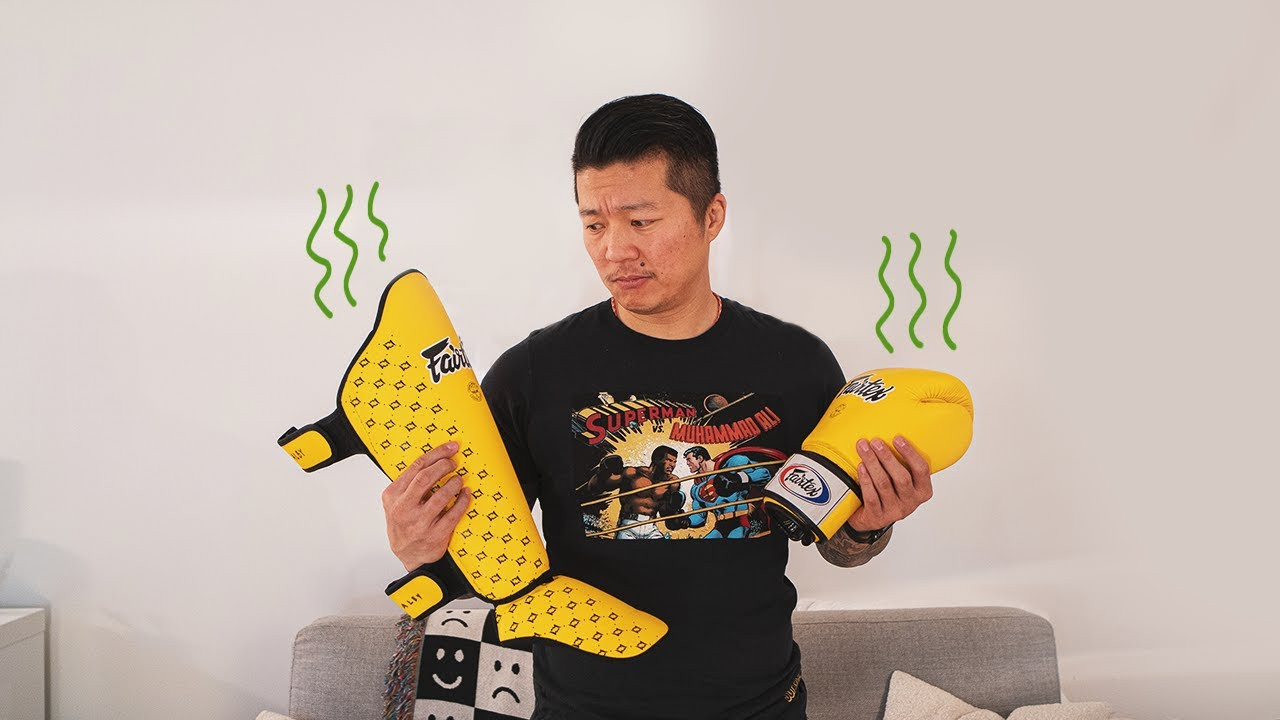Gear Maintenance

Cleanliness is vital when you practice martial arts. True, sweating is part of the equation whenever you have a tough workout, and very few people walk off the mat smelling like a rose. However, you should still try to take preventative measures to keep you and your gear fresh. Since you will be in close contact with other people, it is a matter of etiquette. As noted in the below video by Alby Tam of Combat Culture, a Muay Thai gym in San Francisco, it’s also economical. Maintaining your gear will ensure that it lasts longer and doesn’t need to constantly be replaced.
Below, we will cover the types of gear that you’ll likely use when sparring at a Muay Thai gym. This includes your gloves, shin guards, pads, hand wraps, and mouth guard. Before getting into these specific pieces of gear, it’s important to go over two general rules.
General Rules
Moisture Is Your Enemy
Before we get into specific pieces of gear, there is one rule to always keep in mind: Moisture and bacteria are a stinky combination, largely because bacteria colonies need moisture in order to thrive. While you can’t completely eliminate bacteria, you can prevent those colonies from growing, which will keep the stink off your gear. In addition to keeping the stink away, reducing moisture will also increase the longevity of your gear.
Spending a little bit of time and money on prevention will ultimately save you from having to buy new gear all the time, which can quickly add up. Conversely, simply sticking your gear in your gym bag directly after use will basically lead to a bacteria feeding frenzy, which will mean that your gear will be less fresh and less durable.
Keep Your Velcro Closed
Another general point to keep in mind is that Velcro stops working when it starts collecting dust and lint, and this is bound to happen if you don’t fasten the Velcro back together when you’re not using your gear. While it’s fine to leave the straps on your gear to air out directly after use, make sure to secure the Velcro when you go to store your gear. It will keep the bonds of the Velcro stronger longer, which means it won’t flap open during use.
Gloves
Wipe them down every time you use them. Take paper towels and wipe them off inside to get moisture out. If you do need to clean the outside of your gloves, use a gentle detergent rather than a harsh chemical, since the latter may be corrosive and damage your gloves.
Once you’ve wiped them down, put something in the gloves that will absorb any additional moisture. You can buy glove dogs, which are specifically designed for this purpose, or you can use newspaper or even socks with rice. If you have a seriously damp set of gloves, you can also use boot driers.
Shin Guards
As with gloves, you’re going to wipe them down after use. In some cases, the interior part of the guard may be kind of porous and breathable, which might make it a bit more difficult to wipe down. If that’s the case, you can put them out in the sun to dry when you get home.
Thai Pads, Focus Mitts, and Belly Pads
After wiping down your pads to get rid of any moisture, you’ll probably want to spray them with a gentle disinfectant, especially belly pads since they are more likely to come into contact with feet. Similar to your shin guards, you’ll probably want to put belly pads out in the sun to dry.
Hand Wraps
Hand wraps are extremely good at absorbing sweat. Once you get home, use water and vinegar or a disinfectant spray, and then hang them up. You can also throw them in a delicates bag (something you can find at any box store like Target), which will keep them from getting tangled. As with other gear, you probably want to avoid putting them in the dryer, since this can cause a lot of wear and tear. Instead, just hang them up to air dry.
Something that Alby recommends—but isn’t totally necessary—is a hand wrap roller. It’s a small device that makes rolling up your hand wraps easier, and it can be very convenient once you get a serious collection of wraps—something that tends to happen once you’ve been doing Muay Thai for a few months.
Mouthguards
Last but not least is your mouthguard. Though it’s unlikely that poor mouthguard maintenance is going to lead to serious wear and tear, you should be cleaning your mouthguard regularly because it goes in your mouth. Alby recommends rinsing it after use with soap and water, though soaking it in a weak vinegar solution is a fine method too. Once it’s been cleaned, let your mouthguard air dry, and then put it in a container. It could be a special mouthguard protector; it could be a sandwich bag—anything that will prevent dust and dirt from getting on your mouthguard.

